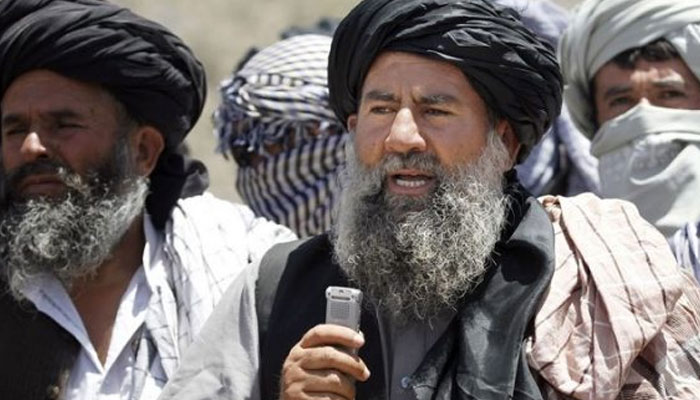Afghan Taliban vow to abide by peace agreement
PESHAWAR: The Afghan Taliban said they would abide by the peace agreement reached with the United States in Doha on February 29 and would avoid targeting the Afghan security forces and their installations in major cities and populated areas in Afghanistan though they had ended their ‘reduction in violence’ (RIV) with the Afghan government last week. Also, Afghan Taliban spokesman in Doha Suhail Shaheen said they had raised in the “Joint Communication Channel” the recent attack on Taliban in Afghanistan’s Helmand province by the US military.
Senior members of the Afghan Taliban told The News from somewhere in Afghanistan’s Helmand province that though they were not bound to spare the Afghan security forces and their installations, they had principally decided not to attack them in major cities and other populated areas. “This is what we had committed in the peace accord that we would not carry out attacks in cities and other populated areas of Afghanistan. Also, we decided not to attack even the Afghan forces in cities but would be free to target them in rural areas,” said one senior Taliban leader.
Pleading anonymity, he said they had been training their fighters as usual in various training centres in Afghanistan for their planned ‘spring offensive’, to be launched by the end of March or early April. However, the Taliban leader said they would be waiting for the outcome of the purposed intra-Afghan dialogue, before launching their much publicised “spring offensive.” “Every year we launch spring offensive with a new name. This year we may or may not launch it officially. With the US-led foreign forces, we have already signed an agreement not to fight. And as for as the Afghan security forces are concerned, we would be waiting for the intra-Afghan dialogue and its outcome,” the Taliban leader explained.
He said presently around 10,000-12,000 of their fighters were under training and their plan was to reach the number up to 15,000 this year. Meanwhile, Taliban were not happy with recent attack on their position in Afghanistan’s Helmand and decided to raise it on the proper forum. Taliban spokesman in Doha Suhail Shaheen said it is mentioned in the peace accord that they (US) can defend themselves or the Afghan security forces in case they come under attack by the Taliban within the same premises but not in a place far away from the site of the attack.
“In case they come under attack or Taliban target their checkpoint, or Taliban came under attack, they have the right to defend themselves within the same premises. It would be violation of the peace accord in case they used air power or any other weapon to target Taliban positions in another area, away from the site of the attack,” Suhail Shaheen explained. He said there was a separate “Communication Channel” and besides US and Taliban, the Qatar government was part of it and its domain was to “thoroughly” investigate such issues.
Shaheen didn’t explain if there is any type of punishment or fine which would be imposed on the accused party if it was found it had committed violation. “Well we didn’t devise any strategy how to tackle issues like violation of the peace accord but the ‘joint communication channel’ is the right forum to discuss as the aim was to prevent this type of incidents in future,” he argued.
He said they had agreed to meet the head of prisons department of the Afghan government regarding prisoners’ swap and refused meeting with the Afghan government’s delegation in Doha. The US military attack on Taliban compound in Nahre Saraj area of Helmand province had enraged Taliban militants and they threatened they would not spare even US forces in case they violated the peace accord again. Shaheen, however, denied these reports and said they would abide by the peace accord.
-
 Gigi Hadid Feels 'humiliated' After Zayn Malik's 'pathetic' Comment: Source
Gigi Hadid Feels 'humiliated' After Zayn Malik's 'pathetic' Comment: Source -
 Olympics Men Hockey Game: McDavid, Crosby Power Canada Past Czechia
Olympics Men Hockey Game: McDavid, Crosby Power Canada Past Czechia -
 Sony PlayStation State Of Play Reveals 'Castlevania' And 'Metal Gear' Return
Sony PlayStation State Of Play Reveals 'Castlevania' And 'Metal Gear' Return -
 Ontario Tuition Freeze Ends, Allowing Colleges And Universities To Raise Fees
Ontario Tuition Freeze Ends, Allowing Colleges And Universities To Raise Fees -
 King Charles Should Apologise To All Rape Victims, Says New Poll
King Charles Should Apologise To All Rape Victims, Says New Poll -
 Cardi B Shares Emotional Message Amid Stefon Diggs Split Rumors
Cardi B Shares Emotional Message Amid Stefon Diggs Split Rumors -
 James Van Der Beek’s 'heartbroken' Ex Wife Breaks Silence Of His Death
James Van Der Beek’s 'heartbroken' Ex Wife Breaks Silence Of His Death -
 Sarah Ferguson, Shamed Andrew Spotted In ‘family Costume Drama’
Sarah Ferguson, Shamed Andrew Spotted In ‘family Costume Drama’ -
 Kylie Kelce Reveals Why She Barely Planned Her Wedding Day?
Kylie Kelce Reveals Why She Barely Planned Her Wedding Day? -
 Why Shamed Andrew Called His Victims ‘Mrs Windsor’
Why Shamed Andrew Called His Victims ‘Mrs Windsor’ -
 Kate Hudson Explains Why Acting Isn't Discussed At Home
Kate Hudson Explains Why Acting Isn't Discussed At Home -
 Prince William, Kate Middleton Epstein Statement Was AI Generated, Says Expert
Prince William, Kate Middleton Epstein Statement Was AI Generated, Says Expert -
 Sarah Ferguson On Her Way To Hurt 'only Two People Who Care About Her'
Sarah Ferguson On Her Way To Hurt 'only Two People Who Care About Her' -
 World’s Top PC Maker Sounds Alarm Over Memory Chip Shortage
World’s Top PC Maker Sounds Alarm Over Memory Chip Shortage -
 King Charles Is ‘clearly Worried’ Andrew Has Tarnished Royal Image
King Charles Is ‘clearly Worried’ Andrew Has Tarnished Royal Image -
 Royal Family Loses 'loyal' Worker After King Charles Disliked His Work?
Royal Family Loses 'loyal' Worker After King Charles Disliked His Work?




